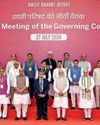
THE INTERMINABLE CRISES that have beset Delhi seem to be going from bad to worse. After decades of being administered by the Central government through a chief commissioner and then a lieutenant governor, a 1991 constitutional amendment led to the Government of National Capital Territory of Delhi Act. It elevated Delhi administration to the status of a Union territory, with a legislature, a chief minister and a council of ministers, while keeping the lieutenant governor in charge of land, public order and police. The lieutenant governor also ensured that the elected governments did not come into conflict with the Central government.
Right from 1993, the time the first elected government took office in Delhi, there were disagreements, but even so, the atmosphere remained cordial. Two things were non-negotiable. Every chief minister maintained good relations with the Centre, even as the Central ministries remained receptive to Delhi's needs as the capital of India. While every chief minister had his or her pet priorities, no one doubted the competence and commitment of the officers whose advice was generally listened to and acted upon.
For several years now, however, Delhi's governance has slipped into a continually belligerent mode. One can blame several factors for the bedlam, but the unwillingness to display maturity has contributed the most. This is not the sort of governance that the citizens of the capital city deserve.
This story is from the July 28, 2024 edition of THE WEEK India.
Start your 7-day Magzter GOLD free trial to access thousands of curated premium stories, and 9,000+ magazines and newspapers.
Already a subscriber ? Sign In
This story is from the July 28, 2024 edition of THE WEEK India.
Start your 7-day Magzter GOLD free trial to access thousands of curated premium stories, and 9,000+ magazines and newspapers.
Already a subscriber? Sign In

Doctor's doctors
Internists deal with prevention, diagnosis and treatment of all kinds of diseases, while also coordinating with doctors across specialties

WORK THIS OUT!
What is the true cost of a 90-hour workweek? Reduced productivity, mental health issues and severe health risks, say doctors

The experience of oppression
The British enacted several laws that might appear liberal, only to then veto the invocation of progressive measures. Nevertheless, these milestones guided the founding fathers in conceiving and creating the Constitution of India

One, two, buckle my shoe!
“Darling,” I said to my life companion of more years than I care to remember, “Do you think there is any correlation between pain in the feet and attending prayer meetings?”“You really are a stupid old man!” said the light of my life. “Can’t you think of anything more bizarre so late at night?”

A helping hand
Over the past year, Imaginarium has placed 3D-printed parts in space, in human bodies, in oil fields in the Middle East, and as drones on the Indian border

Fading federalism
One of the most visible indicators of the erosion of state autonomy is the diminishing financial independence of states

FOUNDING MOTHERS OF THE CONSTITUTION
THEIR CONTRIBUTION IN THE MAKING OF THE REPUBLIC REMAINS EXEMPLARY AND INSPIRING

Value every breath
VO2 max is the best way to measure fitness and predict life expectancy

Statutes of unity
The Constitution reminds us that national oneness comes through addressing inequalities, not enforcing uniformity

Incomplete equality
Equal marriage rights is one of the last bastions of patriarchy and to dismantle it, the recognition of marital rape as an offence is non-negotiable